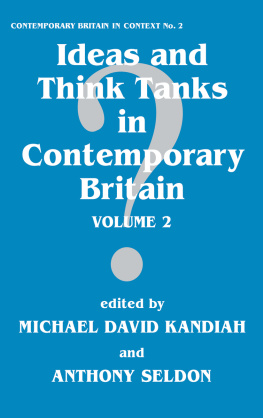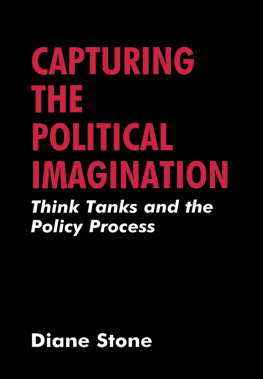First published in 1996 in Great Britain and in the United States of America by
FRANK CASS & CO. LTD.
Published 2013 by Routledge
2 Park Square, Milton Park, Abingdon, Oxon OX14 4RN
711 Third Avenue, New York, NY 10017 USA
Routledge is an imprint of the Taylor & Francis Group, an informa business
Copyright 1996 Taylor & Francis
British Library Cataloguing in Publication Data
A catalogue record for this book is available from the British Library
| ISBN 978 0 7146 4771 5 | (hardback) |
| 978 0 7146 4328 1 | (paperback) |
| 978 1 3150 3672 4 | (eISBN) |
Library of Congress Cataloging-in-Publication Data
A catalog record for this book is available from the Library of Congress
This group of studies first appeared in a Special Issue:
'Ideas and Think Tanks in Contemporary Britain', Part II of Contemporary British History , Vol.10, No.2, Summer 1996, published by Frank Cass and Company Limited.
All rights reserved. No part of this publication may be reproduced, stored in a retrieval system, or transmitted in anyform, or by any means, electronic, mechanical, photocopying, recording or otherwise without the prior written permission of the publisher.
ANDREW GAMBLE
The relative importance of ideas and interests in shaping economic policy has been much debated. One influential position, associated with Dicey, argues that public policy in each age is shaped by general doctrines about the nature of a society and the role of government. Individualism which dominated the nineteenth century was supplanted by collectivism in the twentieth, only in its turn to be challenged by the revival of doctrines of economic liberalism in the 1970s and 1980s. An alternative tradition, represented by both public choice and Marxism, rejects this account of the formation and the development of public policy, emphasising instead the role of interests and explaining how policy evolves, rejecting ideological and idealist accounts. A third tradition criticises the other two for being reductionist, which prevents them from analysing the complexity of the historical and institutional contexts in which economic policy emerges.
Introduction
The dispute about the relative importance of ideas and interests in the shaping of policy and events is among the oldest in political science. Since we can only know the world through concepts, the real opposition is not between ideas and interests but between two kinds of ideas. Interests do not exist in some substratum of human experience which is devoid of concepts. What individuals desire, intend, value, and need are what constitute their interests.
The problem in political science has always lain in determining exactly what is involved in the different dimensions of interest, and how these are related to doctrines and other forms of intellectual knowledge which arise from systematic reflection on human experience. Doctrines in this sense are contrasted with the practical knowledge which is the basis of interests and of social life.
If all intellectual knowledge remained reflective it would be removed from practical experience and would have no influence on events. But intellectual knowledge, particularly if not exclusively in modern times, continually overflows its boundaries and has become an instrument of considerable power in the realisation of interests. This is most apparent in the case of the applications of scientific knowledge, but modern rationalism also extends to the design and evaluation of social and political institutions.
In the study of society, however, there has never been the kind of intellectual consensus that some of the physical sciences have enjoyed. As a consequence the evolution of economic policy, for example, is sometimes presented not as the interplay of individual and group interests, but as a struggle between rival doctrines or even Weltanschauungen ('world views').
Rationalist modes of discourse are now so deeply embedded in our culture that most discussions of policy assume their validity. The dispute between ideas and interests can seem one-sided as a result. Doctrines are privileged in rationalist thought as belonging to a higher order of rationality than interests. Interests are conceived as private and either individual or sectional, whereas doctrines are taken to be universal, partly because they offer more complete and objective explanations than any account founded upon interests, and partly because they claim to represent the interests of all, the public interest. For that reason they claim to offer a guide to the choices policy-makers face which has more moral legitimacy and practical efficacy.
Political Economy and Public Policy
Two kinds of doctrines are relevant to the argument of this article. Joseph Schumpeter and Lionel Robbins both distinguish political economy from the science of economics. Robbins defines political economy as the principles of public policy in the field of economics, concerned more with prescription than with description, and devoted to the search for solutions to the problems of policy. Like Schumpeter, he sees economic analysis as the province of value-free generalisations, providing objective knowledge of how economies work. The economist is a technician called in because of his expert knowledge.
Most economists in this century have shared this view of their role and their discipline. Keynes looked forward to the day when economists would be regarded like dentists, while Milton Friedman defended his decision to give advice to the Chilean military government in these terms:
In spite of my profound disagreement with the authoritarian political system of Chile, I do not consider it as evil for an economist to render technical economic advice to the Chilean Government, any more than I would regard it as evil for a physician to give technical advice to the Chilean Government to help end a medical plague.
The realm of normative prescription is reserved for political economy. The distinguishing feature of political economy according to Schumpeter is
an exposition of a comprehensive set of economic policies that its author advocates on the strength of certain unifying normative principles, such as the principles of economic liberalism, or socialism.
My purpose here is not to inquire whether this distinction is valid, but merely to note that this separation between normative doctrines and valuefree science is one of the cornerstones on which the economics profession has been founded. The basis of the distinction, however, is certainly not that only political economists are concerned with policy. Economists are just as much involved. Although they cannot advise on final goals, they can advise on the practicality of achieving particular goals.













